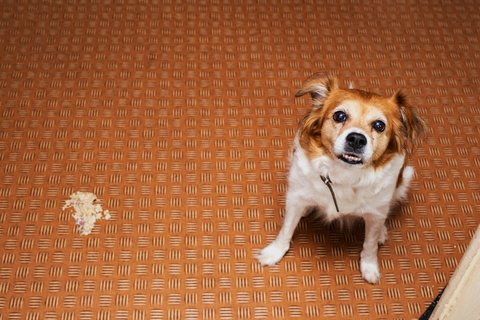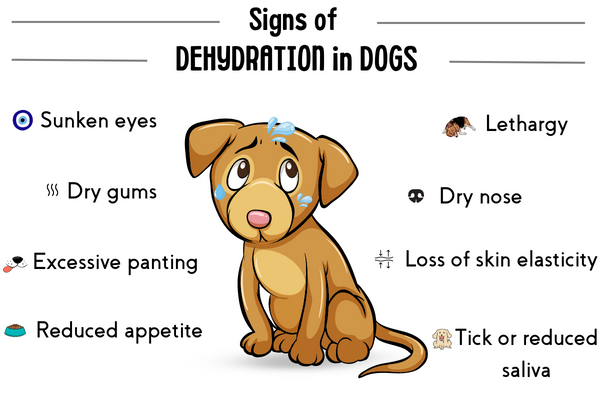We're diving into a topic that's a bit icky but super important: managing your pup's loose stool and vomiting. As much as we adore our furry friends, dealing with these issues can be as challenging as solving a Rubik's cube in the dark. But fear not! We've got some home remedies that will help get your dog's tummy troubles under control.
Decoding the Causes of Loose Stool and Vomiting
Before we jump into the remedies, let's play detective and uncover the possible causes of loose stool and vomiting. These symptoms can be like unwelcome guests at a party - showing up due to various reasons. Common culprits include:
Dietary Indiscretion
This is a fancy way of saying your dog ate something they shouldn't have. Whether it's raiding the trash or snacking on table scraps, these dietary no-nos can upset their stomach.
Infections
Bacterial, viral, or parasitic infections can wreak havoc on your dog's digestive system. These infections often stem from sources we might not immediately consider. A prime example is
coprophagia, which is a fancy term for when dogs eat poop. It might sound gross, but it's a relatively common canine behavior.
Eating feces, whether it's their own or
from other animals, can expose dogs to a variety of harmful pathogens. These include bacteria like Salmonella and E. coli, as well as parasites such as hookworms, roundworms, and giardia. Once ingested, these pathogens can quickly multiply in your dog's system, leading to symptoms like loose stool and vomiting.
It's important to address this behavior promptly, not just to prevent infections, but also to ensure your dog doesn't develop a persistent habit. Regular deworming and keeping your dog's environment clean are key steps. However, if you notice your dog exhibiting this behavior, it's best to consult with your vet to explore underlying causes and appropriate interventions.
Remember, prevention is always better than cure. By understanding and mitigating these risks, we can help keep our furry friends both happy and healthy.
Food Intolerances or Allergies
Just like us, our canine companions can have their own set of
dietary no-gos. Food intolerances and allergies in dogs are more common than you might think and can often be the hidden culprits behind digestive woes.
Unlike simple indigestion, these sensitivities occur when a dog's immune system wrongly identifies certain food ingredients as harmful, triggering a defensive response.
This overreaction can manifest in various ways, ranging from mild to severe. Symptoms might include chronic loose stool and vomiting, skin irritations, or even ear infections. Common allergens for dogs include beef, dairy, wheat, egg, chicken, lamb, soy, pork, rabbit, and fish. Yes, it's a long list, and it can sometimes feel like navigating a dietary minefield to figure out what's causing your furry friend's distress.
The tricky part is that these reactions may not be immediate. They can develop over time, making it challenging to pinpoint the exact cause. If you suspect your dog might be suffering from food intolerances or allergies, it's best to consult with your vet. They might recommend an elimination diet, where you remove certain foods from your dog's diet and gradually reintroduce them to identify the offender.
Stress and Anxiety
Emotional upheaval isn’t just hard on the mind; it can also affect your dog’s stomach. Like humans, dogs can physically manifest stress and anxiety, often resulting in digestive issues like loose stool and vomiting.
Common triggers include changes in their environment,
separation anxiety, or loud noises like thunderstorms.
These stressors can disrupt their normal digestive process, leading to discomfort. Recognizing and addressing these emotional needs through comforting routines, behavior modification, or vet-recommended therapies can help soothe both their mind and stomach.
Underlying Health Issues
Sometimes, loose stool and vomiting can be a sign of something more serious, like pancreatitis, liver disease, or intestinal obstruction.
Understanding the root cause is crucial. While home remedies can be helpful, they're not a substitute for professional veterinary care, especially if the problem persists.
1. Hydration: The First Line of Defense
Dealing with loose stool and vomiting can leave your dog dehydrated faster than a cactus in the desert. Ensure they have access to fresh water and consider giving small amounts of an electrolyte solution recommended by your vet.
2. Bland Diet: The Digestive System's Comfort Food
When your dog's stomach is doing somersaults, a bland diet is your go-to. Boiled, unseasoned chicken and plain white rice can soothe their upset stomach and help solidify their stool.
Pumpkin: The Superfood for Sensitive Stomachs
Plain canned pumpkin (not the pie filling) is like a magic potion for digestive issues. Its fiber content helps with loose stool, and its nutrients support overall gut health.
3. Probiotics: The Tiny Warriors of Gut Health
Adding probiotics to your dog's diet can be a game-changer. These beneficial bacteria help balance the gut microbiome, which can be disrupted by loose stool and vomiting.
4. Fasting: A Short Break for the Digestive System
Sometimes, a brief fasting period can be just what the doctor ordered for your dog's digestive system. By giving the stomach and intestines time to rest, fasting can help reset the digestive process and aid in recovery. This doesn't mean you should abruptly stop all food intake; rather, a carefully planned, short-term fast, often lasting 12 to 24 hours, can be beneficial.
However, it's crucial to undertake this under the guidance of a veterinarian, especially for puppies, older dogs, or those with existing health conditions. After fasting, reintroducing a bland diet gradually is key to avoid further digestive upset.
The 'No-No' List: What to Avoid for Your Dog's Safety
When it comes to treating our canine buddies, it's crucial to remember that their bodies don't always react to substances the way ours do. Steer clear of human medications unless specifically advised by your vet.
Common over-the-counter medicines like ibuprofen, acetaminophen, or naproxen can be toxic to dogs, even in small doses.
Vigilant Monitoring: Knowing When to Call the Vet
Keep a watchful eye on your dog. If symptoms of loose stool and vomiting persist for more than 24 hours, or if you notice alarming signs like lethargy or blood in their stool or vomit, it's time to consult your vet.
Navigating the tricky waters of loose stool and vomiting in dogs is no walk in the park, but with these home remedies, you can provide some relief. Remember, your vet is your partner in your dog's health journey. Together, let's keep our pups happy, healthy, and far from digestive distress!
FAQ

What Is Diarrhea and Vomiting Together Called?
Diarrhea and vomiting together are commonly referred to as gastroenteritis, which denotes inflammation of the stomach and intestines.
What Should I Do if my Dog Has Diarrhea and Vomiting?
If your dog has diarrhea and vomiting, ensure they stay hydrated, consider a temporary bland diet, and monitor closely. If symptoms persist or worsen, consult your veterinarian immediately for proper diagnosis and treatment.
How Long Should I Wait to Take my Dog to the Vet for Vomiting and Diarrhea?
If your dog experiences vomiting and diarrhea for more than 24 hours, or if they show signs of dehydration, lethargy, or blood in their vomit or stool, it's important to take them to the vet immediately. Early intervention can prevent more serious complications.
How Long Does Dog Gastroenteritis Last?
Gastroenteritis in dogs typically lasts a few days, but the duration can vary. Mild cases may resolve within 24 to 48 hours, while more severe instances might take a week or longer. Prompt veterinary care and appropriate treatment can aid in faster recovery.




